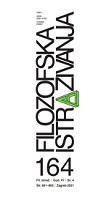Glavni aspekti aktualnosti Nietzscheove kritike kulturalizma i naturalizma
The Main Aspects of the Topicality of Nietzsche’s Critique of Culturalism and Naturalism
Author(s): Vesna R. Stanković PejnovićSubject(s): 19th Century Philosophy, Culture and social structure , Ontology, Philosophy of History
Published by: Hrvatsko Filozofsko Društvo
Keywords: Friedrich Wilhelm Nietzsche; culture; naturalism; critic; paradox; science;
Summary/Abstract: The topicality of Friedrich Nietzsche’s thought is reflected in his critique of mass culture, society and the state, and scientific methods, which later had a significant impact on modern discourse. Mass culture is the foundation of modern social reality as a force of decadence and nihilism that degrades the authentic and creates a mediocre culture. Nietzsche opposed a “culture” that implies a transcendence and sublimation of “nature” into the forms of “moral” ideals, and he called for a natural life without harmful cultural influences that are an obstacle to a healthy human life. The idea of nihilism present in culture is relevant to our time because it manifests as a loss of depth or meaning in life itself, which, like nature, is chaos, without structure or empirical evidence. To understand the scientific revolution and its impressively devastating pace in the high-tech laboratories of our global research ecosystem, relevant is Nietzsche’s perspective aimed at demystifying science, especially positivism and naturalism, which seek to impose truth based on scientifically verified knowledge. Scientific interpretations and constructions are efforts to control and “humanise” nature by adapting chaos to our anthropomorphic expectations, needs, and concerns and making chaotic nature predictable. The paper shows that Nietzsche’s critique of culturalism and naturalism is based on the vision of the life of the “last man human” who rejects the culture of self-overcoming and dismantles reduces the fear of the uncertain and sudden and lives enframed in reality as presented by the scientific community. In the life of the contemporary human being, the will to live is merely maintained because he lacks the will to power
Journal: Filozofska istraživanja
- Issue Year: 41/2021
- Issue No: 04/164
- Page Range: 695-717
- Page Count: 23
- Language: Croatian

